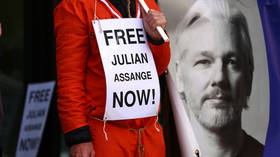Assange pleads guilty to espionage
Wednesday’s court hearing in Saipan marked the end of the WikiLeaks founder’s 14-year legal battle for freedom
WikiLeaks founder Julian Assange has pleaded and been found guilty in a US court to a single espionage charge. He is now free to return to his native Australia, having already served five years in a British prison.
Assange pleaded guilty to one count of conspiracy to obtain and disseminate national defense information at the United States District Court for The Northern Mariana Islands in Saipan on Wednesday morning. He will likely be handed a 62-month prison sentence immediately afterwards, but as his five years served in London’s Belmarsh Prison will be counted towards this sentence, he will not see the inside of a jail cell.
Assange was accompanied in the courtroom by Australian Ambassador to the US Kevin Rudd, Australian Ambassador to the UK Stephen Smith, and his lawyer, Jennifer Robinson. Asked by Judge Romana Manglona whether he was pleading guilty or not guilty, he responded “guilty.”
The former WikiLeaks chief told Judge Manglona that he believed that the First Amendment to the US Constitution protected his publication of classified material, and that “the First Amendment and the Espionage Act are in contradiction with each other.” However, he added that he is pleading guilty because “it would be difficult to win such a case, given all the circumstances.”
The outcome of Wednesday’s hearing was widely known in advance. “We anticipate that the defendant will plead guilty to the charge…of conspiring to unlawfully obtain and disseminate classified information relating to the national defense of the United States,” the US Justice Department wrote in a letter to the court on Tuesday. “We expect [Assange] will return” to Australia after the day’s proceedings, the department added.
Assange’s 14-year fight for freedom began in 2010, when he was arrested by British police over sexual assault charges in Sweden that were later dropped, Assange jumped bail in 2012 and was granted asylum in the Ecuadorian embassy in London. He was arrested again in 2019 when Ecuador revoked his asylum, and spent the next 1,901 days in Belmarsh.
The US Justice Department unsealed an indictment against Assange on the day of his arrest, charging him with 17 counts of espionage. Assange spent the next five years fighting extradition to the US, where he would have faced up to 175 years behind bars if convicted.
The charges against Assange stemmed from his publication of classified material obtained by whistleblowers, including Pentagon documents detailing alleged US war crimes in Iraq and Afghanistan.
The WikiLeaks founder was released from Belmarsh on Monday, two months after the Wall Street Journal reported that his lawyers were in talks with US officials about a potential plea deal. Assange was preparing to mount a final appeal against his extradition at the time, and the WSJ’s sources claimed that US President Joe Biden wanted to reach an agreement rather than deal with the “political hot potato” of a journalist arriving in Washington to face criminal prosecution so close to November’s presidential election.
You can share this story on social media:









Comments are closed.